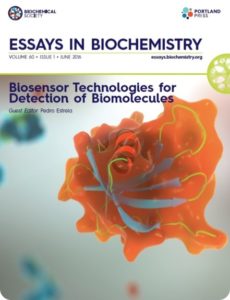Dr Pedro Estrela from the Department of Electronic and Electrical Engineering is the guest editor of the book "Biosensor Technologies for Detection of Biomolecules" published by the Biochemical Society and Portland Press as a volume of the journal Essays in Biochemistry.
This peer-reviewed series of themed volumes, published in print and online, is aimed at final-year undergraduates, their teachers and starting postgraduates, rather than the research community. The volume is not intended to be a textbook or to be comprehensive, rather a collection of 13 short, punchy chapters, each summarizing some of the current areas of interest, pointing to future developments and conveying the excitement of the field for the relatively inexperienced, but interested, reader.
In vitro molecular biosensors are nowadays ubiquitous in biomedical diagnosis as well as a wide range of other areas such as point-of-care monitoring of treatment and disease progression, environmental monitoring, food control, drug discovery, forensics and biomedical research. Biosensor devices require the interaction of different disciplines and rely on very distinct aspects such as study of interactions of biorecognition elements with biomolecular analytes, immobilisation of biomolecules onto solid surfaces, development of anti-fouling surface chemistries, device design and fabrication, integration of biology with the devices, microfluidics, on-chip electronics, packaging, sampling techniques, etc.
Developments in the area of biosensors rely deeply on interactions between life sciences and physical/engineering sciences, which is not always easy to achieve, in particular due to "language barriers" and the compartmentalisation of disciplines in traditional undergraduate curricula. This interaction needs to be promoted at the undergraduate and early postgraduate levels so that a common language can be learnt by the student, which will in the short and medium term lead to novel bio-(nano)technologies and devices. This volume therefore will be useful not only for biochemistry and biomedical students and their teachers but also for engineering and physics/chemistry students (and their teachers).
Respond
